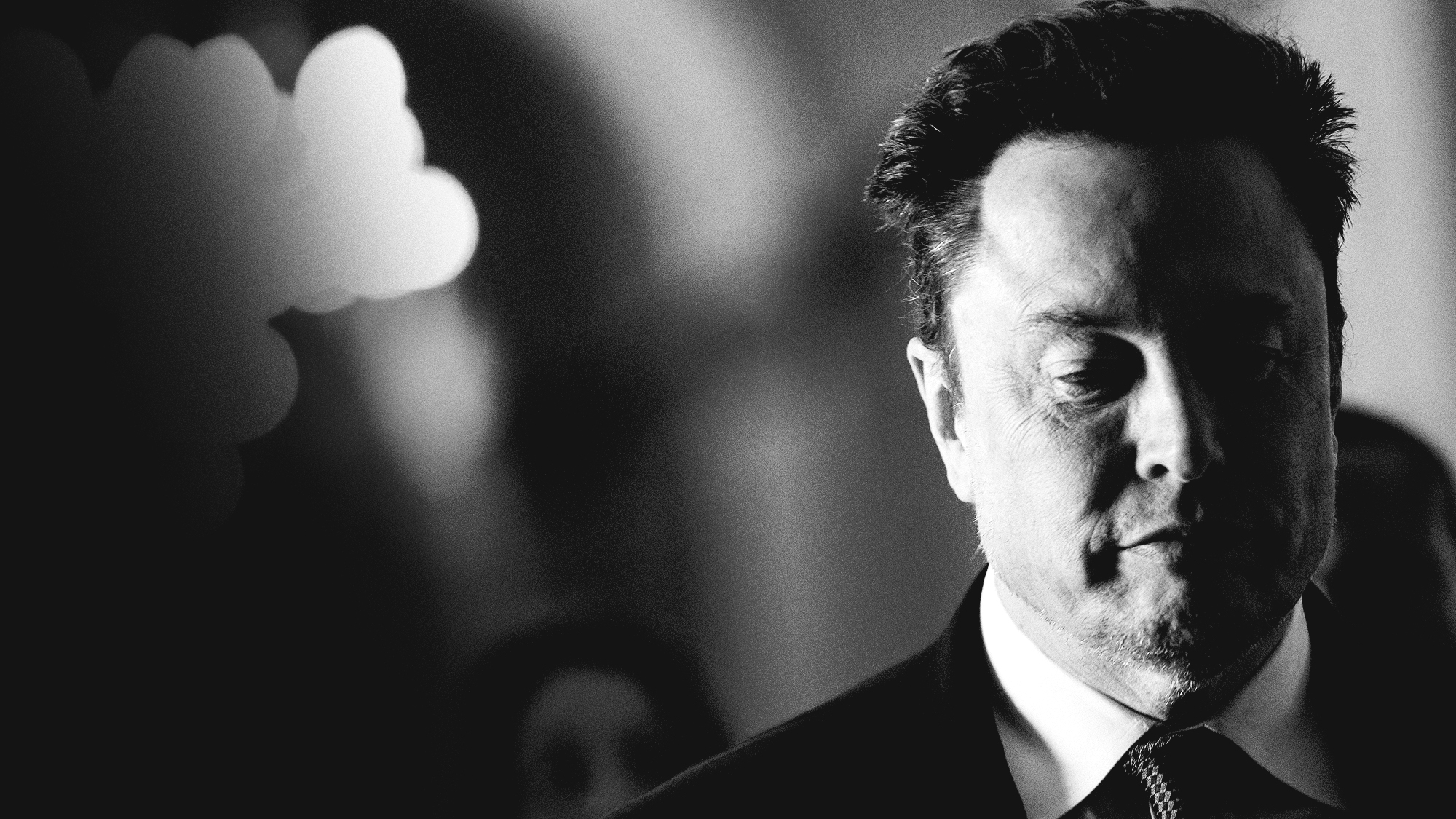Elon Musk and politics: is X owner playing dangerous game?
Politicians are struggling to deal with Musk's use of X as 'his own personal political bullhorn'

A free daily email with the biggest news stories of the day – and the best features from TheWeek.com
You are now subscribed
Your newsletter sign-up was successful
When Elon Musk bought Twitter in 2022, he had "lofty aims", said Finn McRedmond in The New Statesman. The billionaire wanted to cultivate a "common digital square"; a platform that "could accommodate wide-ranging beliefs and facilitate debate without violence".
But "fast forward to England in 2024, and this ideal has totally collapsed", said McRedmond. "High streets are ablaze, and while X is not to blame, it is far from innocent." The platform is "awash with violent rhetoric" that has spilled out from the digital square onto the streets.
'His own personal political bullhorn'
"This was a test for the new Labour administration, and not one it has passed," McRedmond continued. Musk, a man "whose cosmic ambition is matched only by his base puerility", tweeted on Sunday that "civil war is inevitable" in Britain. A Labour spokesperson responded, saying there was "no justification" for Musk's intervention.
The Week
Escape your echo chamber. Get the facts behind the news, plus analysis from multiple perspectives.

Sign up for The Week's Free Newsletters
From our morning news briefing to a weekly Good News Newsletter, get the best of The Week delivered directly to your inbox.
From our morning news briefing to a weekly Good News Newsletter, get the best of The Week delivered directly to your inbox.
But "like all agitators, Musk was buoyed by the attention". Giving the X owner "any oxygen at all was a mistake: it debased the public conversation and fanned Musk's rhetorical flames". As the unrest subsides, Labour may begin to question, "what can be done about these social media platforms? Should anything be done?"
Musk's behaviour on X mirrors his actions in the US online space, where he has "used the platform as his own personal political bullhorn", said Vittoria Elliott in Wired. In July, Musk posted a deepfake video of presidential candidate Kamala Harris, in which she appears to say that she is the "ultimate DEI [diversity, equality, inclusion] hire" and a "deep-state puppet".
After endorsing Donald Trump last month, Musk also "boosted baseless conspiracies of a 'coup'" following Biden's withdrawal from the presidential race and insinuated that the Trump assassination attempt "might have been the result of an intentional failure on the part of the Secret Service".
Former Twitter trust and safety employees have said that Musk's "increasingly partisan behaviour around the US elections" and other major events show he is "doing exactly what he accused the company's former leadership of doing: playing politics".
A free daily email with the biggest news stories of the day – and the best features from TheWeek.com
One former employee labelled Musk's actions as "staggering hypocrisy", adding: "Musk is smart enough to know social media is media, and it's a way to control the narrative." Other former employees expressed concern that Musk represents a "new kind" of political actor, "someone who seeks to actively use a platform to reshape politics in both the US and abroad, and is willing to endure regulatory fines and declining advertising revenue to do so".
Musk the 'greatest challenge' to reining in extremist content
Musk's "latest flurry of innuendo, half-truths, and lies online is making it increasingly clear that it is the tech mogul – and not just his platform – who poses the greatest challenge to governments struggling to rein in content that can incite extremist violence", said Politico.
In response, "angry officials are trying to find levers to pull to influence the world's richest man". British MPs have expressed their intent to "haul Musk in" for questioning over his posts amid UK rioting while, in the US, investigations are under way into potential misuse of personal data by a super political action committee created by Musk.
But other countries have already "tried and failed" to hold Musk accountable. When X refused to censor posts of a stabbing attack in Australia, it led to a federal court case that the platform ultimately won. Similarly, in Brazil, a Supreme Court justice ordered an investigation into Musk over his alleged dissemination of fake news.
"Elon is weaponising this in a way it hasn't been weaponised before," said Democratic strategist Adam Parkhomenko, speaking to Politico, referring to Musk's posts and his hands-off approach to content moderation on X.
But there are fewer ways to restrict Musk's reach since his takeover of the company, taking it private, the strategist noted. "There's not as many options on the table as there might be, if this was something else, like a publicly traded company."
Sorcha Bradley is a writer at The Week and a regular on “The Week Unwrapped” podcast. She worked at The Week magazine for a year and a half before taking up her current role with the digital team, where she mostly covers UK current affairs and politics. Before joining The Week, Sorcha worked at slow-news start-up Tortoise Media. She has also written for Sky News, The Sunday Times, the London Evening Standard and Grazia magazine, among other publications. She has a master’s in newspaper journalism from City, University of London, where she specialised in political journalism.
-
 The Week Unwrapped: Do the Freemasons have too much sway in the police force?
The Week Unwrapped: Do the Freemasons have too much sway in the police force?Podcast Plus, what does the growing popularity of prediction markets mean for the future? And why are UK film and TV workers struggling?
-
 Properties of the week: pretty thatched cottages
Properties of the week: pretty thatched cottagesThe Week Recommends Featuring homes in West Sussex, Dorset and Suffolk
-
 The week’s best photos
The week’s best photosIn Pictures An explosive meal, a carnival of joy, and more
-
 Will Peter Mandelson and Andrew testify to US Congress?
Will Peter Mandelson and Andrew testify to US Congress?Today's Big Question Could political pressure overcome legal obstacles and force either man to give evidence over their relationship with Jeffrey Epstein?
-
 How long can Keir Starmer last as Labour leader?
How long can Keir Starmer last as Labour leader?Today's Big Question Pathway to a coup ‘still unclear’ even as potential challengers begin manoeuvring into position
-
 What is at stake for Starmer in China?
What is at stake for Starmer in China?Today’s Big Question The British PM will have to ‘play it tough’ to achieve ‘substantive’ outcomes, while China looks to draw Britain away from US influence
-
 DOGE shared Social Security data, DOJ says
DOGE shared Social Security data, DOJ saysSpeed Read The Justice Department issued what it called ‘corrections’ on the matter
-
 Can Starmer continue to walk the Trump tightrope?
Can Starmer continue to walk the Trump tightrope?Today's Big Question PM condemns US tariff threat but is less confrontational than some European allies
-
 ‘The security implications are harder still to dismiss’
‘The security implications are harder still to dismiss’Instant Opinion Opinion, comment and editorials of the day
-
 Alaa Abd el-Fattah: should Egyptian dissident be stripped of UK citizenship?
Alaa Abd el-Fattah: should Egyptian dissident be stripped of UK citizenship?Today's Big Question Resurfaced social media posts appear to show the democracy activist calling for the killing of Zionists and police
-
 Biggest political break-ups and make-ups of 2025
Biggest political break-ups and make-ups of 2025The Explainer From Trump and Musk to the UK and the EU, Christmas wouldn’t be Christmas without a round-up of the year’s relationship drama